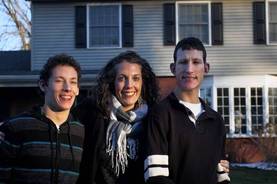 Growing up with a severely disabled brother, Abby Brown felt less like a sister than like a "third parent." Nigel, two years her junior, was born with a rare disease called linear sebaceous nevus syndrome that left him non-verbal and needing assistance to eat, dress and use the toilet. As a child, Brown mourned the normal things she couldn't do, like take family vacations or go to the mall, without her brother having a seizure. As an adult, she nervously anticipates a time when she'll be in charge of his care."Where will he live when my parents are unable to take care of him?" wonders Brown, 21, a student at Nipissing University in North Bay, Ontario. "How will I manage taking care of aging parents, a disabled brother and children of my own? Will I ever find a partner who is willing to take on the responsibility of caring for my sibling with me?" Brown's concerns are emblematic of the complex, lifelong and generally unsung relationships between disabled people and their siblings, who often log more years than anyone supporting their special needs brothers and sisters without getting much support of their own. "I find myself frequently in the ludicrous position of having to remind my friends, my colleagues, people who worship at the altar of family-centered services, that siblings are part of the family," said Don Meyer, director of the Seattle-based Sibling Support Project (siblingsupport.org) and creator of Sibshops, workshops that bring together the siblings of special needs kids for recreational activities and peer support. On his Facebook group Sibnet, an adult sibling support site with 1,300 members, Meyer is struck by how common it is for 40-year-olds to proclaim it's their first time meeting others who grew up with developmentally disabled siblings. "People who work with families of kids with special needs would never let the parents wait 40 years to introduce them to their peers," Meyer said. Lifelong challenge A sibling's need for support begins early, Meyer said, as growing up alongside a disabled child forges complicated feelings, from embarrassment to resentment to many forms of guilt. Some siblings feel pressure to be high achievers to balance the scale. Many yearn for the friendship of a "normal" sibling relationship. The experience has its benefits, too: Siblings of special needs kids tend to develop early maturity and increased patience, diplomacy, tolerance and acceptance of difference, Meyer said. Many pursue helping professions, where they serve as powerful advocates for marginalized populations. As parent caregivers get older, a sibling's role takes on new importance, and underscores the value of nurturing the siblings' relationship. About 75 percent of the 4.6 million developmentally and intellectually disabled people in the U.S. live with their families. "If we affirm and validate their contributions as they grow up, we increase the chances that they will elect to remain lovingly involved in their (disabled siblings') lives," Meyer said. To read more click here: http://articles.chicagotribune.com/2013-03-28/features/sc-fam-0326-disabled-sibling-20130326_1_disabled-siblings-sibling-support-project-don-meyer
0 Comments
|
AuthorRebecca is an independent publisher working to help siblings of children with emotional challenges. Archives
April 2017
Categories
All
|
My Big Brother Bobby: A Story to Help Kids Understand Angry Feelings and Behaviors in Others
 RSS Feed
RSS Feed
